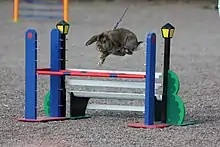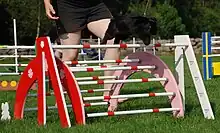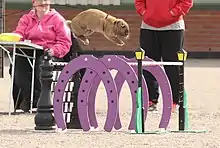Rabbit show jumping
Rabbit show jumping (Swedish: Kaninhoppning[1]), also known as rabbit agility[2] or rabbit hopping,[3] is an animal sport where the animals are led through a course by their owners,[4] modelled after horse show jumping.[5][6] It is typically conducted in a closed, indoor arena, with obstacles scaled to suit the rabbits. Competitions have been held in the United States[3] and several European countries.[2] As rabbits are common domestic pets, some owners train their pet rabbits for this sport.[2]
 | |
| Nicknames | Rabbit hopping, rabbit agility |
|---|---|
| First played | 1970s, Sweden |
| Characteristics | |
| Contact | No |
| Type | Outdoor |
| Equipment | Hurdles |
| Presence | |
| Country or region | Worldwide |
| Olympic | No |

History
Rabbit jumping started in Sweden in the 1970s,[7] when the first rabbit club started to arrange rabbit jumping competitions.[5]
At that time, the rules were based on the rules from horse jumping, but were later reformed to be better-suited for rabbits. The sport grew throughout Sweden and several rabbit jumping clubs were formed to support the growing interest. In the early 1990s, Norway joined in with rabbit jumping activities, developing new clubs and joining Sweden in rabbit jumping competitions.[5] The Sveriges Kaninhoppares Riksförbund (Swedish Federation of Rabbit Jumping) was established on September 3, 1994. Rabbit show jumping became popular in all parts of Sweden.[8]
Germany joined the other countries in starting their own rabbit hopping club in 2000. Organizations were established in Norway (2002) and Finland (2004). Training and participation with translations for a new set of rabbit hopping rules came from the judges' committee in Denmark.
The sport reached the United States in the 80s.[4] The Rabbit Hopping Organization of America was founded in 2001.[9][10] The rules and guidelines for rabbit hopping were for the club with the help of the judges' committee in Denmark and with personal assistance from judge Aase Bjerner.[9]
The American Hopping Association for Rabbits and Cavies (AHARC) was chartered with the American Rabbit Breeders Association in 2013. The rules and guidelines for this association were moulded after RHOA and Denmark. The AHARC held the very first official national competition in the United States during the 2011 ARBA Convention in Indianapolis, IN. The performance competition for rabbits during 2013 ARBA convention in Harrisburg, Pennsylvania was a Mid Atlantic Rabbit and Cavy event. AHARC had the first national performance event for cavies during the 2014 ARBA TX convention.[3] A rabbit hopping competition was held in 2017's North Carolina State Fair.[11] The Rabbit Hopping Society of Australia was founded in 2013, also with the assistance of Aase and Rasmus Bjerner.[12]
In 2015 Freya Pocock Johansson founded Rabbit Hopping New Zealand.[13]
Record jumps
The world record for the highest rabbit jump is 107 centimetres (43 in), and was achieved in March 2023 by Holloway Ch Tennessine, owned by Marie Kozubková from Czech Republic.[14] From June 2019 Miss Pinkys Grand Champion Harajuku "Dobby", owned by Julia Samson from Sweden, hold the world record for longest jump, at 301 centimetres (9.88 ft), achieved in August 2017.[15]
Earlier records
High Jumps:
Miss Pinkys Grand Champion Harajuku "Dobby (2016) (Sweden) 106 centrimetres (42 in)
Snöflingans Majesty of Night (2015) (Sweden) 105 centimetres (41 in)
Snöflingans Majesty of Night (2012) (Sweden) 100 centimetres (39 in)
Tøsen (1997) (Denmark) 99.5 centimetres (39.2 in)
Long Jumps:
Yaboo (1999) (Denmark) 300 centimetres (120 in)
Courses

Official rabbit hopping competitions consist of a straight course, a crooked course, high jump, and long jump. In a straight course all the obstacles are placed in a straight line and have to be jumped in succession. In a crooked course, the obstacles are placed in an interloping path in which the obstacles must be jumped in the correct order.
Straight and crooked courses are divided into 5 levels.[8] The measurements are slightly different in different countries.
Mini: Max 26 cm high, 30 cm long (6-8 obstacles)
Easy: Max 30 cm high, 45 cm long (8 obstacles)
Medium: Max 38 cm high, 65 cm long (10 obstacles)
Advanced: Max 45 cm high, 75 cm long (10 obstacles)
Elite: Max 50 cm high, 80 cm long (12 obstacles)[5]
The mini-course is an introductory course. In order to progress from easy to medium, etc. a rabbit has to earn promotion points. Rabbits are placed according to the number of faults they have (such as knocking a rail down). Time only comes into play if 2 placing rabbits have tied for the same placing.
A rabbit has a set time (usually 60 minutes) to complete the course; if the time runs out before the course is completed, the rabbit is disqualified.
Breeds

All breeds are allowed to compete; however, there may be problems with smaller and larger breeds. (Rabbit size is usually determined by weight: dwarf rabbits are smaller than 2 kilograms (4.4 lb) and giants bigger than 5 kilograms (11 lb).)
The ideal jumping rabbit has long legs and a medium-long back, which will help it correctly judge the height and length of obstacles. In the case of slender bone structures, such as the Belgian Hare, the legs should be strong and muscular so high jumps will not hurt them. In Scandinavia, where rabbit show jumping has a strong base, most are crossbreeds, bred with good jumpers as parents, similar to the method of breeding lurchers, deliberately crossbred racing dogs. Scandinavian Jumping Rabbits can be regarded as their own breed, with well-kept pedigrees.
References
- Williams, Victoria (2015). Weird sports and wacky games around the world: from Buzkashi to Zorbing. Santa Barbara, CA: Greenwood. p. 132. ISBN 9781610696395. LCCN 2014040274. Retrieved 1 April 2016.
- "Rabbit Agility". RSPCA - Royal Society for the Prevention of Cruelty to Animals. Retrieved 26 January 2018.
- "American Hopping Association for Rabbits and Cavies". AHARC.com. Google Sites. Retrieved 26 January 2018.
- Baczewski, Matt (6 April 2015). "Rabbit Hopping Competitions Jump in Popularity". NBC10 Philadelphia. Retrieved 24 November 2022.
- "About Kaninhop - Rabbit Show Jumping". Topend Sports. Retrieved 2022-08-11.
- "Rabbit Show Jumping". News For Kids. 22 August 2019. Retrieved 2022-08-11.
- "Rabbit Agility Factsheet" (PDF). RSPCA. Archived from the original on 24 November 2022. Retrieved 24 November 2022.
- "Rabbit Jumping". Sveriges Kaninhoppares Riksförbund. Retrieved 24 November 2022.
- "History of Rabbit Hopping". Rabbit Hopping Society of Australia. Retrieved 16 August 2022.
- "Rabbits". Retrieved 14 May 2023.
- Stancill, Jane (16 October 2017). "A big hit at the NC State Fair: hopping rabbits". The News & Observer. Raleigh. Retrieved 24 November 2022.
- Sheil, Donal (12 July 2019). "Competitive rabbit hopping aims for new heights in international competition". ABC News (Australia). Retrieved 24 November 2022.
- "Home". Rabbit Hopping NZ.
- "Králičí hop - Rekordy". May 14, 2023.
- "Rekord". Sveriges Kaninhoppares Riksförbund (in Swedish). Retrieved 24 November 2022.